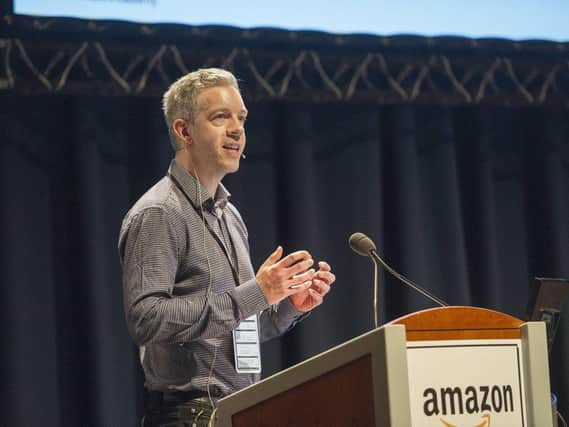The Big Interview: Amazon's Development Centre Scotland MD Graeme Smith


The site, at Waverley Gate in the centre of the capital, is making room for a further 250 posts. The tech boss said in October 2018, when the expansion was announced, that the new roles were “Silicon Valley jobs right here in the heart of Scotland”.
But the Scottish tech scene has continued to make so much headway – growing one and a half times faster than the economy overall and supporting almost 100,000 jobs – that Smith finds himself now adjusting his frame of reference.
Advertisement
Hide AdAdvertisement
Hide Ad“I’m going to stop talking about Silicon Valley jobs in Scotland and I’m just going to say these are really amazing internet technology jobs – and they’re right here in Edinburgh.”


Seattle-based Amazon.com was incorporated in 1994 by Jeff Bezos – who apparently chose the name as it started with the first letter of the alphabet and because of its association with the South American river.
He is famously now worth in excess of $100 billion, and personally gave the green light to the proposal that the Scottish capital serve as the location for Amazon’s first research and development centre outside North America on the back of its deep talent pool and history of innovation.
The site is billed as a global centre for innovation, software engineering and machine learning – with Smith stressing that its work benefits hundreds of millions of global customers of the internet behemoth. “It’s not so long ago we were really like a start-up,” he says.
Progress
Indeed, in its earliest days Bezos paid a visit, with a photo taken of him laughing and sitting on the floor surrounded by staff perched on garden furniture – and a projector on a picnic table. “We’ve come a long way,” says Smith.
He has led the centre since 2010, having grown it from 35 staff. Workers are mostly software engineers by background with roles spanning machine-learning scientists, user experience and visual designers and product managers.
“We’ve got everybody here that you need to start and run an internet technology business,” he says, adding that ADCS is far from being some far-flung branch to which tasks are outsourced. “This is not a centre where someone’s just telling us what to do… We’re able to start and run big internet technology businesses for Amazon right around the world.”
Smith says ADCS’s work spans three major areas. First there’s the consumer business, including personalised shopping recommendations.
Advertisement
Hide AdAdvertisement
Hide AdSecond, there’s digital advertising – which Smith says is a vast area for Amazon, analysing aggregate data to understand how customers shop and help advertisers plan and manage their campaigns. Smith is also now chief operating officer of Sizmek, with Amazon having acquired its ad-serving technology earlier this year.
The third focus for Amazon’s work in Edinburgh is what Smith terms “talent management” – and he is keen to let his team have the time to invent.
There was much attention on the news last year that at Waverley Gate Amazon would be creating space for new roles dedicated to research and development, while its Customer Service Centre, the previous occupant of the space, would relocate within the Scottish capital.
The new roles were part of a raft of 1,000 new posts planned across the UK, including jobs in Manchester and Cambridge.
Exciting
“Scotland and Edinburgh in particular are home to some of Europe’s most exciting start-ups, so it is fantastic we are able to expand our presence here,” Smith said at the time of the announcement. He sees Edinburgh as a “world-class capital city – a great place to live, work and build a career in technology”.
Amazon has some 2,500 employees in Scotland – encompassing fulfilment centres in Dunfermline and Gourock, its Prime Now site in Glasgow, and delivery stations in Dundee and Motherwell.
The retail giant said in October in its third-quarter report that its total staff (excluding contractors and temps) amounted to 750,000, marking a 22 per cent year-on-year rise. The firm also posted net sales of $70bn for the period, from $56.6bn 12 months previously.
Revenues in the UK last year reached £10.9bn, but it paid just £220 million in direct taxes in the country for the period.
Advertisement
Hide AdAdvertisement
Hide AdThe company has been working to stress its desirability as an employer after facing continued concerns over the working conditions of its warehouse staff. It was reported in 2016 that Amazon workers in Dunfermline had to resort to sleeping in tents near the company’s warehouse to save money. There has also been a spotlight on the amount of data the firm holds on its consumers.
When questioned on the latter, Smith emphasises the use of aggregate rather than individualised data being used to help people find products suited to them they never would have located otherwise.
Amazon was a relative minnow when Smith joined as a senior manager in 2006, when it had a global headcount of 15,000. He seems to have been destined for a digital-oriented career path from an early age, and was “always interested in technology and pushing buttons” as a child.
Having grown up in Blairgowrie, getting his first computer led him into programming, and when it came to choosing his degree course, he did toy with the idea of studying music – he had a gig playing the piano in a hotel bar.
Robust
But ultimately he felt that his other choice, computing, offered a better chance to develop a robust career.
While still a student, he had taken up a part-time job providing pre-sales and support for high-end software tools. And after graduating he says he invented and led delivery of the world’s first software metrics, with the product sold to investment banks and telecoms companies around the world.
This was followed by a spell working for JP Morgan. He helped launch and grow Intelligent Finance (IF), a division of Bank of Scotland. IF, one of the original pioneers of online financial products, debuted in the autumn of 2000, having been founded by Jim Spowart, who previously helped launch Direct Line. IF was “where I learned more about the world of business, I learned a bit about banking, I learned about leading bigger projects”, says Smith.
He also spent some time in management consultancy. But eventually signed up with Amazon in an effort to find a role more closely related to customers.
Advertisement
Hide AdAdvertisement
Hide AdSmith highlights various initiatives in which the company is now involved, such as a tie-up with the University of Edinburgh, hiring an academic to come in one day a week and share learning and research and run experiments. The university has been a “tremendous” organisation to work with, and its School of Informatics “is a world-leading institution and an important partner for the centre”, says Smith.
There is also its Future Makers programme that runs in primary schools across Edinburgh, aiming to inspire a diverse range of young people to engage with engineering and technology before they enter secondary school.
Encouragement
Additionally, there is the Amazon Future Engineer scheme, which launched across the UK in September, a “comprehensive” childhood-to-career programme promoting computer science via, say, bursaries for young people and teacher training.
And, in a bid to encourage women to pursue science, technology, engineering, and maths (STEM) careers, there is the Amazon Women in Innovation Bursary, which was originated in Edinburgh by Smith and has expanded to London and Cambridge. It provides university funding for women to take up degrees linked to industry. The retailer noted last year that only 16 per cent of computing undergraduate students in Scotland were female.
Additionally, Amazon has also sponsored the Scotland Women in Technology Awards.
Such efforts are part of a broader drive in the sector. Earlier this month, the Tech She Can Charter was launched north of the Border by PwC, Royal Bank of Scotland and Morgan Stanley to address gender balance in technology roles, aiming to prompt a lasting increase in the number of women pursuing such careers.
For three years Smith was a board member at digital technology trade body ScotlandIS – which is now led by Jane Morrison-Ross.
As the ADCS gains momentum, what does he want to see it become in coming years? “It’s hard to predict the future in this business, but what I would dream of is really more of the same. I want this team to stay focused on what customers really want… I want us to be making a bigger and bigger contribution to future research and development at Amazon.”